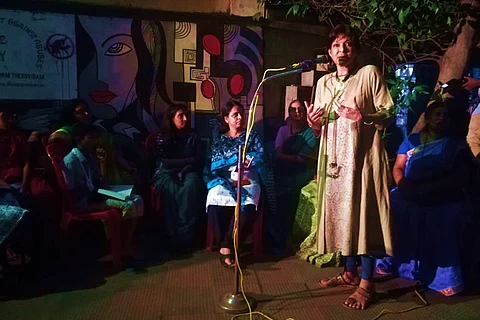Kerala has turned into an educated silent society: Mallika Sarabhai
The small crowd in a corner of the Manaveeyam Veedhi in Thiruvananthapuram waited for Mallika Sarabhai to speak about Sabarimala. They knew she would. Her speech began with the women of Kerala, some of whom were her ancestors whom she knew to be great fighters. The dancer-cum-activist addressed the issue towards the last part of her speech, leaving no doubt as to what she thought about a tradition that has changed over the years, about how old it really was, and who decided the rules.
“Religion today is very far from the religion of whenever it was born. Who is that has brought these rules, who enforces them, and how old is that tradition? Traditions have been recreated. You had a tradition like Sati and you have an idiotic book called Manusmriti that says Dalits and women need to be weaklings. But society has evolved. Once, when Gandhiji was told that a year ago he had said something opposite of what he said then, he answered that his knowledge of today is not what it was last year. He admitted his knowledge was incorrect and that he is changing. Shouldn’t our society be like that? Treating each other with respect… I find the word ‘tolerating’ very offensive. When you tolerate, you are repressing anger. You should instead be accepting – you do it your way and I will do it mine,” Mallika said.
She found it incredible that people have developed this ego that made them think they can protect their gods. “We see ourselves as the saviour of the gods. Do you think Krishna is so weak that you have to go and kill people in the name of Krishna? Or Rama or Ayyappa? How can people be so insulting of gods? Jesus needs to be protected? We give them divine powers and then we take them away. I am a deeply spiritual Hindu. But I accept every god. In Bharatanatyam, we have a beautiful prayer with which we begin our rehearsals and shows. It involves banging my feet on the floor. The prayer says ‘Mother, Mother Earth, please forgive me for I’m going to hit you with my feet but it’s my way of saluting and celebrating you’.”
The dancer spoke of the matriarchal society that Kerala had been, and how its women have changed into silent, meek sufferers and spectators. “I began working with the Kerala State Women Development Corporation to begin to understand what this silence was about. They invited me to Kerala and I met women who wore sindoor on their hairlines. I asked them what’s this sign and they said it’s what they have seen on television. I asked if they knew what it meant, they didn’t. I said it meant your husband owns you,” she said.
Mallika began a campaign then, going to colleges and sensitising young women on gender awareness. At the end of her sessions, she heard stories from girls, stories of abuse and silence. She studied the case files of KSWDC, of the pressures that families faced because of the demand for gold and dowry, the pressures that young women faced to keep quiet when an ‘uncle’ molested them. “We took those studies and we made a film called Unarthupaatu. It was a fictionalised version of all these difficult stories. I learnt that women don’t even accept the need to fight. We have turned from an educated society to an educated silent society.”
Mallika then spoke of the Women in Cinema Collective and hearing about how the women in WCC were denied work. “If there were more women filmmakers, then the men wouldn’t have so much power,” she said. Women were reluctant to fight these battles, for the economic repercussions were immediate, she asserted, saying, “I know for I have been suffering for 17 years for having spoken against the genocide that happened in Gujarat in 2002. In 2018, I am still on the blacklist.”
Mallika also spoke of Me Too, of the need to ensure that it is not trivialised. “It has brought a sisterhood among women. That is what is going to propel us to have a greater voice to say what is wrong, what our rights should be as Indians and as citizens of this world.”
But she emphasised that men have to be taken along in this race. “It is not a race between men and women. It is about treating people with dignity, as equal democratic citizens of the Indian nation. In a patriarchal society, neither the men nor the women are free. Neither have the capacity of being human beings.”
There are so many definitions for a person, Mallika said. Two people could be feminists, vegetarian and non-vegetarian, mothers and fathers, Hindus and Muslims. But the politics of this day have reduced everyone to one identity. “We are reduced to who prays to which god,” she said.

